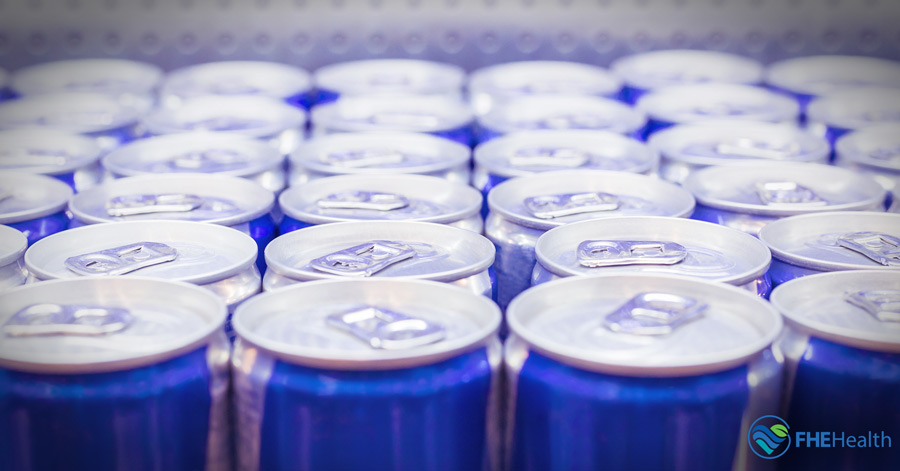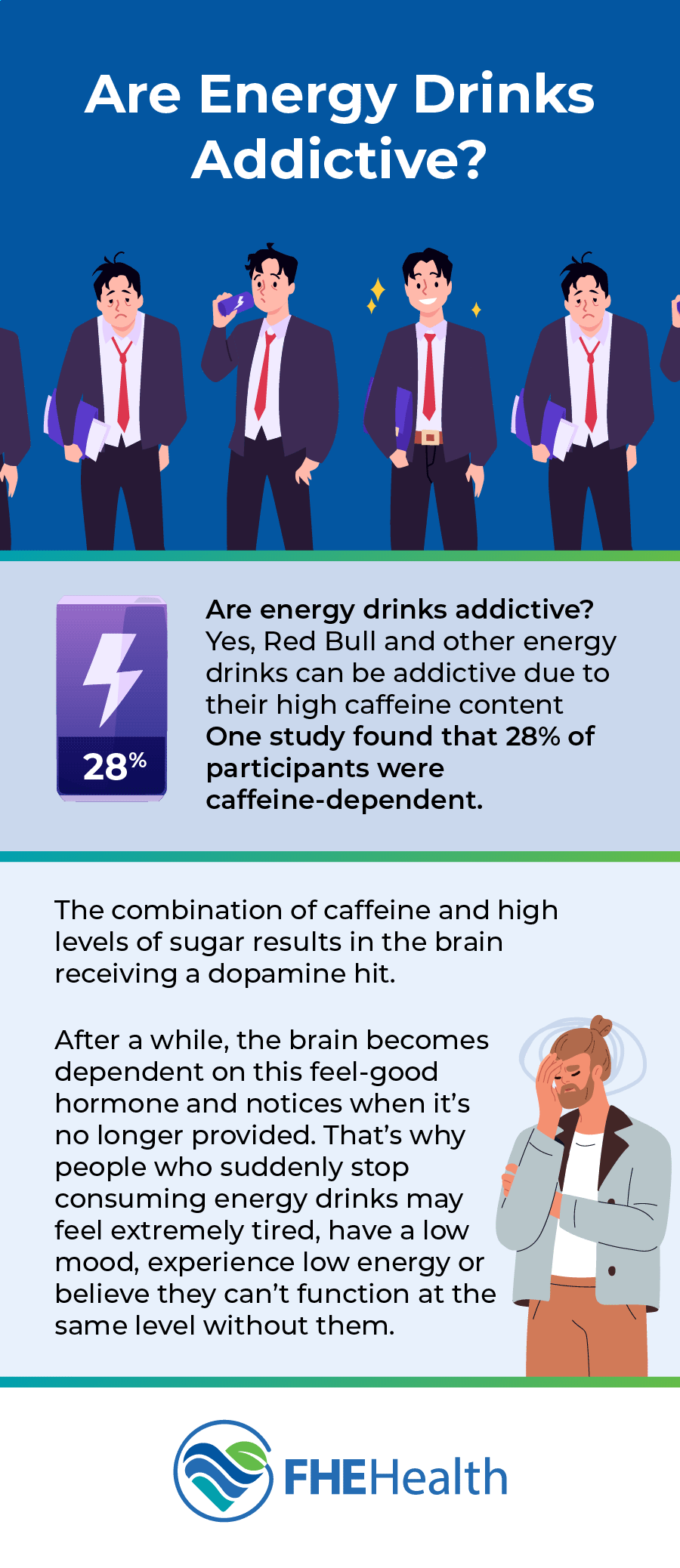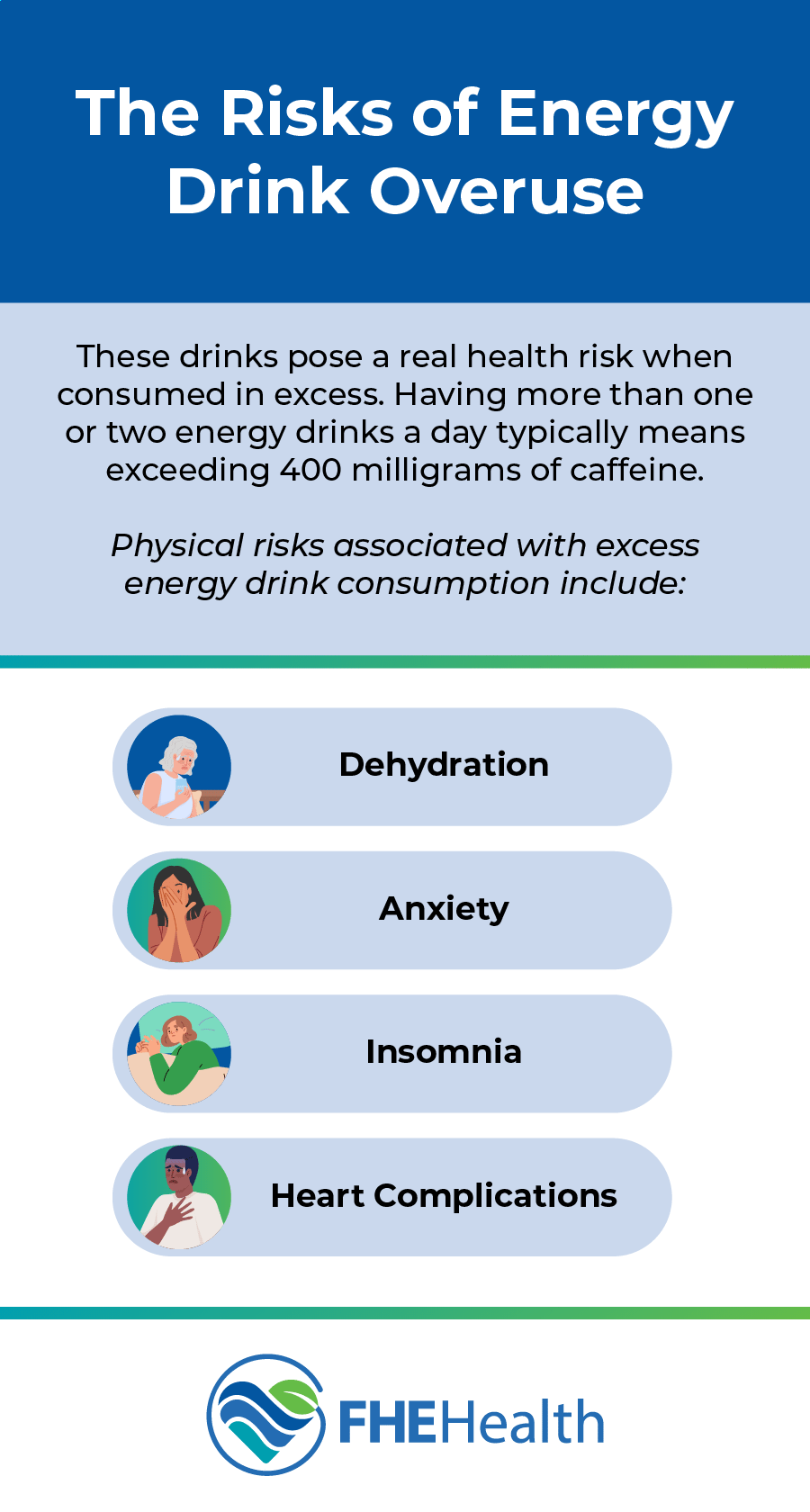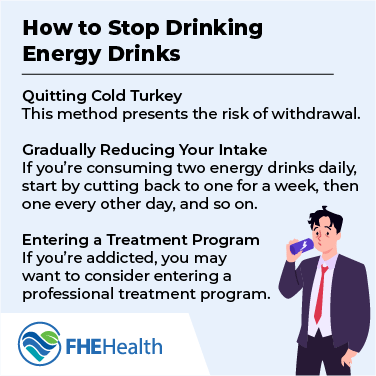
Energy drinks seem as harmless as a cup of coffee. Their marketing makes them appear to be a fun way to boost energy levels, improve concentration and achieve more with less sleep and rest. However, the harsh reality is that energy drinks aren’t as innocent as they appear. Not only can the high caffeine levels increase your risk of heart problems, but sugary drinks of any kind present a real risk of weight gain and developing type 2 diabetes. They can also cause sleep problems, digestive issues and anxiety when consumed in excess.
Is Red Bull addictive? Find out whether it’s possible to develop a dependence on energy drinks from popular brands like Monster and Red Bull and what signs indicate you may be dealing with an addiction.
Is Red Bull Addictive?
 Are energy drinks addictive? Yes, Red Bull and other energy drinks can be addictive due to their high caffeine content. Like other caffeinated products, they have the potential to create a physical dependence. One study found that 28% of participants were caffeine-dependent. The combination of caffeine and high levels of sugar results in the brain receiving a dopamine hit from drinking a Red Bull or Monster beverage.
Are energy drinks addictive? Yes, Red Bull and other energy drinks can be addictive due to their high caffeine content. Like other caffeinated products, they have the potential to create a physical dependence. One study found that 28% of participants were caffeine-dependent. The combination of caffeine and high levels of sugar results in the brain receiving a dopamine hit from drinking a Red Bull or Monster beverage.
After a while, the brain becomes dependent on this feel-good hormone and notices when it’s no longer provided. That’s why people who suddenly stop consuming energy drinks may feel extremely tired, have a low mood, experience low energy or believe they can’t function at the same level without them.
Addiction vs. Habit Forming: What’s the Difference?
Addiction and habit forming may look the same on the outside, but they’re very different in terms of how they affect your brain. When it comes to consuming energy drinks, there’s a risk of developing an addiction rather than simply forming a habit, as you might when repeatedly consuming a salty bag of chips during times of stress.
In that scenario, there’s a habit that acts as a coping mechanism for a stressful or challenging situation, but there’s no substance in the food that makes it addictive. It’s simply a habitual activity. However, when the beverage or food contains caffeine, like an energy drink, there can be a change to the way you think, make decisions and react to situations. In general, habits are nondestructive, while addictions have potential to be destructive.
What Are the Risks of Energy Drink Overuse?
 According to the Centers for Disease Control and Prevention (CDC), 1,499 adolescents went to the emergency room in 2011 for causes related to energy drinks. These drinks pose a real health risk when consumed in excess. While around 400 milligrams of caffeine is considered “safe” to consume daily for adults, having more than one or two energy drinks a day typically means exceeding this limit.
According to the Centers for Disease Control and Prevention (CDC), 1,499 adolescents went to the emergency room in 2011 for causes related to energy drinks. These drinks pose a real health risk when consumed in excess. While around 400 milligrams of caffeine is considered “safe” to consume daily for adults, having more than one or two energy drinks a day typically means exceeding this limit.
Physical risks associated with excess energy drink consumption include:
The National Center for Complementary and Integrative Health found that the most significant portion of the population consuming energy drinks is men ages 18-34. However, close to one-third of teenagers aged 12-17 report drinking these highly caffeinated and sugary beverages regularly.
There’s also an increased risk of complications from energy drink consumption when the beverage is mixed with alcohol. The same study found approximately 25% of college students in the United States report mixing alcohol and energy drinks.
Signs of Addiction to Watch For
The signs of addiction can manifest in both physical and behavioral changes. Look for these signs in yourself or a loved one to identify addiction:
- Secretive behavior
- Decreased or inconsistent performance at work or school
- Participating in (unusually) risky behaviors
- Changes in personal hygiene level
- Changes in physical appearance due to declining health
- Extremely fast speech, slow speech or slurred speech
- Impaired memory
- Poor decision-making
- Being unable to stop consuming the substance
- Long-term health problems related to the substance use
If you become aware of these behaviors in someone you love or in yourself, it’s time to seek professional support.
How to Stop Drinking Energy Drinks
 As with any addiction, there are a few ways to stop consuming energy drinks. The right option for you depends on your specific situation.
As with any addiction, there are a few ways to stop consuming energy drinks. The right option for you depends on your specific situation.
Quitting Cold Turkey
One option for how to stop drinking energy drinks is to completely halt all consumption. This may be a viable option for you if you’re not addicted to energy drinks. People who simply want to stop drinking them for health reasons but aren’t dependent on them can put the drink aside and not pick it up again. However, if you are addicted, this method presents the risk of withdrawal. In this case, it’s better to ease off the beverage gradually or seek professional guidance.
Gradually Reducing Your Intake
Another option for stopping energy drink consumption without shocking your system is to gradually reduce your intake. If you’re consuming two energy drinks daily, start by cutting back to one for a week, then one every other day, one a week, one a month and, if you want, stopping altogether. Slowly weaning your body off the caffeine and sugar intake may help you see fewer effects of caffeine withdrawal, improving your chances of abstaining from the energy drink in the long term.
Entering a Treatment Program
If you’re addicted to energy drinks and struggling to stop consuming them, you may want consider entering a professional treatment program. Detox programs provide support for people who are trying to abstain from an addictive substance and are experiencing unpleasant withdrawal effects as a result. Talk to your doctor or a therapist at FHE Health about your options.
Addiction Support and Treatment in Florida
FHE Health in Florida has a team of counselors standing by, ready to support you in your journey to manage addiction and improve your quality of life. We work with you to develop a treatment plan that meets your needs, offering both inpatient and outpatient programs. Contact FHE today to find out how we can help.
FAQs About Energy Drink Addiction
Q: It’s just a gas station drink, can I actually be “addicted” to it?
A: It’s a fair question, but the short answer is yes. Just because it’s easy to buy doesn’t mean it’s harmless. These drinks are engineered with high doses of caffeine and sugar that spike your dopamine levels. Eventually, your brain stops seeing the drink as a “pick-me-up” and starts seeing it as a necessity just to feel baseline normal. If you’ve ever tried to skip a day and ended up with a pounding headache or a complete mood crash, that’s your body experiencing a physical withdrawal.
Q: My heart starts racing after my second can and I get the shakes. Is that normal?
A: While it’s common, it isn’t exactly “normal” for your body. Most people don’t realize that two high-potency cans often put you well past the daily recommended limit for caffeine. Those jitters are your nervous system’s way of red-lining. Beyond the immediate discomfort, overdoing it puts a massive strain on your heart and kidneys. If you’re noticing your heart skipping a beat or you’re feeling constantly anxious and dehydrated, those are clear signals from your body that it’s struggling to process the load.
Q: Is professional treatment really an option for something like this?
A: FHE Health offers both inpatient and outpatient addiction treatment options that focus on breaking the habit and addressing the underlying fatigue or stress that led to the dependency in the first place. Energy drinks would fall under process addiction, a behavioral disorder, though it’s worth noting that this can be treated in combination with other common mental health issues like depression, anxiety, alcoholism and the like. Insurance may not approve of treatment for energy drink addiction specifically, but we’re happy to work with you and your insurance for the best possible treatment for your needs.
Q: I usually mix energy drinks with alcohol when I’m out. Why is that considered so risky?
A: It’s dangerous because it sends conflicting signals to your heart. Alcohol is a depressant that slows you down, while the energy drink is a stimulant that speeds you up. This creates a “wide-awake drunk” effect—you might feel sober and alert enough to keep drinking or even drive, but your blood alcohol level is dangerously high. It masks your body’s natural “off switch,” which is often how people end up in the emergency room with heart palpitations or alcohol poisoning.
Q: I’ve started hiding the empty cans so my partner doesn’t see them. Is that a bad sign?
A: Honestly, that’s often the biggest indicator that the habit has become a problem. When you start hiding your behavior, it’s usually because you’re already aware—on some level—that you’ve lost control and you want to avoid a confrontation about it. There’s no shame in that realization; in fact, acknowledging that “secrecy” is part of the cycle is usually the moment most people realize they’re ready for a change.






